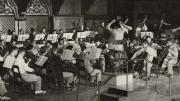On March 6, 1808, six men of Harvard formed the Pierian Sodality: the direct ancestor of the Harvard-Radcliffe Orchestra, which this season celebrates its two-hundredth anniversary.
Whether this makes the HRO the oldest orchestra in America, as it proudly claims, may be subject to debate, because that 1808 fellowship of admirers of the Muses wasn’t an orchestra—it was a convivial association built around liquor, cigars, “performing music for the enjoyment of others,” and “serenading young women in the square.” The sodality went through good years and bad patches. In 1832, Henry Gassett was its only member; he kept it alive by paying dues to himself, holding meetings, and playing flute solos, thereby becoming a hero to subsequent generations of Pierians. By the 1870s, however, the organization had indeed become an orchestra; its mission to advance music had led to the creation of the Harvard Glee Club, the Harvard music department, the Harvard Musical Association, and even the Boston Symphony Orchestra.
Certainly the sodality was the first university symphony orchestra in America, and for a long time the largest. It began to tour in 1908 and, starting in the 1960s, traveled to Europe, South America, or Asia at least once in every student generation. In 1936, women from Radcliffe College were invited to participate as guest performers, and in 1942 the ensemble formally became the Harvard-Radcliffe Orchestra.
Its alumni have included doctors, lawyers, academics, a Speaker of the U.S. House of Representatives, the new music director of the New York Philharmonic, and many players active in major orchestras. Boston Symphony Orchestra assistant principal cellist (and Boston Pops principal) Martha Babcock ’70 played in the orchestra in 1966-’67 before joining the Montreal Symphony. “The HRO experience opened a whole new world for me and raised my standards,” she says. “Some of the pieces we played, like Stravinsky’s Petrushka, I had never heard before. I didn’t really have a distinct career path yet, but this turned out to be the prelude to a satisfying musical life.”

Harvard University Archives
This early 1970s poster for an HRO concert advertises a guest appearance by a young cellist named Yo-Yo Ma.
Senior lecturer on music James Yannatos—known to generations of students as “Dr. Y”—became the orchestra’s music director in 1964. His 44-season tenure has seen many fluctuations and changes: in the late 1960s, for example, some musicians felt the orchestra represented “the establishment” and left for other ensembles; some years have seen no vacancies for certain instruments, while an entire section may graduate in others; meanwhile, the players themselves reflect Harvard’s increasing diversity.
The orchestra rehearses six hours each week, on Tuesday and Thursday nights, in Sanders Theatre. Even as a concert approaches, Yannatos keeps the atmosphere light without compromising the necessary painstaking attention to detail; the players work hard but seem to be having fun.
Co-concertmaster Julia Glenn ’11 has been in orchestras since sixth grade. “My goal has always been to be a professional violinist,” she says, “but even if that changes, I know music is always going to play a big part in my life. With other orchestras I’ve already played a specialized repertoire, but this season the HRO is playing standard pieces I should have covered already, but never had the chance to. I also love the social aspect. There is not a competitive, cutthroat atmosphere…I am with people who bring their problem sets to rehearsal and work on them during the break. This gives the experience a totally different feel. They are more excited about being there, not just doing the things that a musician does as a matter of course.’’
Clarinetist Giancarlo Garcia ’08 may go on in music or pursue mechanical engineering. “I haven’t fully decided,” he says, “but music at Harvard and the HRO have been a huge influence in my life, and music and engineering have advocated for each other. The discipline of going to rehearsals, of playing together and in tune with 100 other people—that’s really important.”
In his early years, Yannatos balanced standard works with repertory few student orchestras were playing: Mahler’s Das Lied von der Erde, for example, or Bartók’s Concerto for Orchestra, which was on the program of the very first HRO concert he led (the virtuoso piece was only 21 years old). That unpredictability continues: programs today range from classics to works by talented Harvard students. And while celebrated performers may appear as guests, most often the soloists are outstanding Harvard musicians, some of whom, like cellist Yo-Yo Ma ’76, D.Mus. ’91, later become celebrities.
On March 7, a day after the actual bicentennial, Yannatos provided another surprising program that sandwiched Mahler’s Songs of a Wayfarer between Gershwin’s An American in Paris and Bernstein’s Symphonic Dances from West Side Story. The reason: assistant conductor John Kapusta ’09, who opened the concert by leading a fiery performance of Brahms’s Tragic Overture, is also a baritone who had won the orchestra’s annual concerto competition by singing the Mahler songs. For this unprecedented double-header, Kapusta got a night off from his usual duties in the trumpet section—although he did write his own program note, urging the audience not to read program notes. Before and after both performances, audience and orchestra members greeted him like a rock star with whoops, whistles, cheers, and the stomping of feet.
“I want to focus on singing,’’ says Kapusta, “but in an ideal future I would like to both sing and conduct. Singers are always being told to ‘Sing this like a violin’—and violinists are told you have to play like a singer. I am trying to take advantage of this opportunity to experience music from every side. To learn how an orchestra works, what to expect, is an informative, fulfilling, and invaluable experience.”
Many alumni agree, demonstrating their affection through the Harvard Pierian Foundation—which came into being in 1962 when the orchestra was stranded while on tour in Mexico and turned to alumni for help. Former bassoonist Mary Ellen Moir ’79, who now works in the software industry, has spent more than 20 years on the foundation’s board. “We meet regularly and support the orchestra both monetarily and with good advice,” she says. “I wish I could say that I played the bassoon more than once or twice a year,” she adds. “But if you play music, you can enjoy it all the more when you listen to it. There are so many things a lifelong love of music can do for you.”
Knafel professor of music Thomas Forrest Kelly, an ex officio member of the foundation, emphasizes the HRO’s importance not only to individual players and alumni, but also to the University and the community that surrounds it. “There are several orchestras and many other musical organizations at Harvard that exist at different levels and for different reasons,” he says. “What the HRO does is stand at the top of the pyramid, because of its history, its size, and the commitment it requires of its members. No matter how talented they are, [its] members are willing to…invest an enormous amount of time working together to achieve a high technical and artistic level; the orchestra inserts the students into something beyond themselves. The result is that the HRO has a developed a substantial following at Harvard and in the community.…It represents a major way that Harvard greets and serves the community. And that’s a great thing.”






